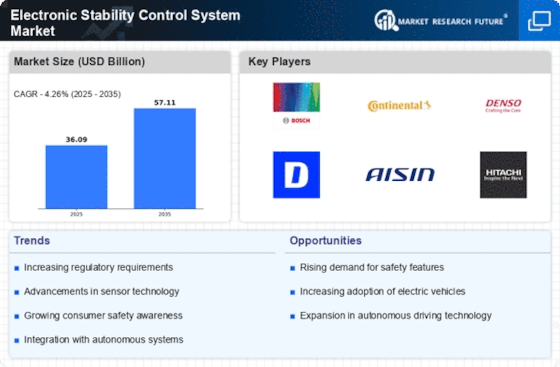Top Industry Leaders in the Electronic Stability Control System Market
*Disclaimer: List of key companies in no particular order
Latest Company Updates:
Electronic Stability Control System Market: A Landscape of Fierce Competition
The Electronic Stability Control System (ESC) market is revving up, propelled by a potent cocktail of safety mandates, technological advancements, and rising consumer demand. This fiercely competitive arena sees established players jostling for dominance while nimble startups try to carve a niche. Analyzing the key strategies, market share dynamics, and emerging trends is crucial to understand the current and future competitive landscape.
Key Players and Their Strategies:
Tier-1 Suppliers: Bosch, Continental, and ZF Friedrichshafen hold a firm grip on the market, leveraging their robust product portfolios, technological expertise, and extensive global reach. Their strategies hinge on continuous R&D, strategic partnerships with automakers, and tailoring offerings to regional regulations and consumer preferences.
Tier-2 Suppliers: Tier-2 players like Denso, TRW Automotive, and Hitachi Automotive Systems aim to differentiate themselves through cost-effectiveness, specialization in specific components, and catering to the burgeoning demand for advanced ESC features. They often collaborate with Tier-1s for system integration and leverage regional strengths to gain market share.
Emerging Players: The scene is enlivened by innovative startups like Autoliv and Veoneer, who inject disruptive technologies like AI-powered ESC and cloud-based data analytics. Their agility and focus on niche applications cater to the evolving needs of premium and autonomous vehicles.
Market Share Analysis: Beyond Size, Consider Complexity:
While market share based on revenue paints a broad picture, a deeper analysis is necessary. Factors like:
Regional dominance: Bosch reigns supreme in Europe, while Continental leads in North America. Understanding regional dynamics is crucial for accurate assessment.
Vehicle segment penetration: ESC penetration in passenger cars is higher than in commercial vehicles. Focusing on segments with higher growth potential is key.
Technology leadership: Players offering advanced features like roll stability control and yaw rate sensors command premium pricing and higher margins.
Emerging Trends: Reshaping the Future:
Advanced Sensor Fusion: Integrating LiDAR, radar, and camera data is leading to more precise and proactive ESC interventions, paving the way for autonomous driving.
Connectivity and Data Monetization: ESC data can be used for real-time traffic updates, predictive maintenance, and personalized insurance plans. Players who leverage this data effectively will gain a competitive edge.
Electrification and ADAS Integration: ESC needs to adapt to the unique dynamics of electric vehicles and seamlessly integrate with other Advanced Driver Assistance Systems (ADAS) like lane departure warning and collision avoidance. Mastering this integration will be crucial for future success.
Overall Competitive Scenario: A Dynamic Race to the Top:
The ESC market is characterized by intense competition, driven by rapid technological advancements, stringent safety regulations, and evolving consumer preferences. Players need to adopt multi-pronged strategies that combine R&D prowess, cost-effectiveness, regional flexibility, and a focus on advanced features. The ability to integrate ESC seamlessly with other ADAS and capitalize on data-driven opportunities will be critical for achieving and maintaining leadership in this dynamic market.
Robert Bosch GmbH (Germany):
• October 2023: Launched its latest ESP i11 generation with improved sensor fusion and software algorithms for faster and more precise intervention. (Source: Bosch press release)
Johnson Electric (Hong Kong):
• September 2023: Announced a new line of compact and lightweight ESC actuators for motorcycles and scooters. (Source: Johnson Electric website)
TRW Automotive Holdings (U.S.):
• December 2023: Acquired German ESC components supplier FTE Automotive, expanding its reach in the European market. (Source: TRW Automotive press release)
Continental AG (Germany):
• November 2023: Partnered with Japanese tech giant NTT Docomo to develop and test cloud-based ESC systems for connected vehicles. (Source: Continental AG press release)
Top listed global companies in the industry are:
Robert Bosch GmbH (Germany), Johnson Electric. (Hong Kong), TRW Automotive Holdings (U.S.), Continental AG (Germany), Delphi Automotive (U.K.), Hitachi Automotive Systems Ltd. (Japan), Autoliv Inc. (Sweden), Toyoda Gosei Co. Ltd (Japan), WABCO Holdings Inc. (U.S.), and Murata Manufacturing Co., Ltd. (Japan)










